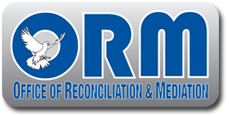September 2019 Monthly Letter

Dear ORM Reconcilers,
The world has rightly celebrated the astonishing event of summer, 1969 when Apollo’s moon landing took us literally out of this world. There is an interesting ORM sidelight to all this which Reconcile Neil Earle reports to us this month.
“All One—For a Brief Season”
Though we have always been space travelers – our planet logs millions of miles every day – the landing of Apollo 11 on the moon was truly a turning point in human consciousness.
Canadian thinker Marshall McLuhan called for a new commitment to unity, observing that “on Spaceship Earth there are no passengers; everybody is a member of the crew. We have moved into an age in which everybody’s activities affect everybody else.”
For a brief moment, that’s the way it was. Astronaut Michael Collins remarked recently about how when the Apollo team travelled the world on a good will tour people from Bangladesh to Brazil pumped their hands and said, “We did it!” We, as in we, the human race, did it.
It was, in some sense a religious experience. And therein hangs a tale. Earlier, in December 1968, the crew of Apollo 8 had drawn legal fire from atheist groups for reading from Genesis 1 while they orbited the moon on Christmas Eve. Broadcasting a reading from a religious book during a government-sponsored space mission seemed to some Americans to compromise the separation of religion and state. To avoid more legal problems over the issue, NASA asked the Apollo 11 crew not to recite any scriptures. (On a humorous note, one judge eventually threw out a legal challenge filed against Apollo 8 by claiming that the event “was out of his jurisdiction.”)
With Neil Armstrong in that lunar module was a Presbyterian elder named Edwin “Buzz” Aldrin. He had somehow wedged into his stowage pouch a plastic bag. In it were a small flask of wine, a chalice and some wafers. About 5:57 p.m. Houston time, he set the elements on the fold-down guidance-computer table. He spoke into his microphone: “This is the LM [Lunar Module] pilot speaking. I’d like to take this opportunity to ask every person listening in to pause for a moment and contemplate the events of the past few hours, and to give thanks in his or her own way.”

Aldrin then gently poured the wine into the chalice. He then recited – silently, as NASA had requested – John 15:5, “I am the vine; you are the branches…. Without me you can do nothing.”
Taking Communion on the moon!
Back on earth, Aldrin’s wife Joan marveled – Buzz had not forgotten the deeper significance of what was happening on July 20, 1969. On his return to earth, Aldrin reflected aloud on the meaning of Psalm 8:3-4, words written some 2,800 years earlier by another gazer into the starry night: “When I consider your heavens, the work of your fingers, the moon and the stars, what you have set in place, what is man that you are mindful of him, the son of man that you care for him?”
Ironically, humanity’s most stunning technological feat took astronauts back to what St. Paul told a group of advanced thinkers back in Athens, Greece, in the first century: God is not far from every one of us (Acts 17:27). No, not even on the moon.
As a lifelong space enthusiast, I interviewed Aldrin in 1974 as he lectured in Regina, Saskatchewan. But I did not know about his extraordinary ceremony till decades later when I was researching the Moon Shot for ORM’s newsletter Reconcile. Shortly after, my friend and colleague Curtis May met Buz at LAX and confirmed that, yes indeed, he did take Communion on the moon.
What a testimony this event was to what the Greeks called the “godlike spark” in all of us and a reminder of how we are never far from His presence and how there are times whe the battered old planet has seemed to know we are all one human family. Advancing that unity, that divine call to reconciliation, is what ORM is all about.
